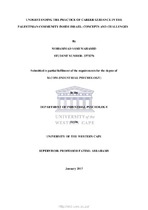Understanding the practice of career guidance in the Palestinian community inside Israel: Concepts and challenges
Abstract
The practice of career guidance in the Palestinian community inside Israel is a relatively recent
phenomenon which became prominent after the emergence of approximately 30 career
guidance centres across the country. The development of career guidance in a context that is
characterised by continuous social underdevelopment, injustice and discrimination raises many
questions around the effectiveness of career guidance and its role in fighting unemployment as
well as the extent to which career guidance services can deliver results on the ground – within
the Palestinian community. In the twenty-first century, we need to consider the changing social
structures and contexts in which career guidance is practiced (Arthur, Collins, McMahon &
Marshall, 2009). Such challenging environment interferes with the practice and its deliverables
making it more difficult for Palestinian practitioners. Hence, in the light of such challenges,
there exists a great need to determine the effectiveness of the services by focusing on a number
of areas such as; the types of career guidance interventions used; the kind of challenges
Palestinian practitioners are faced with; the theoretical framework for career guidance; the
future needs and skills of career guidance practitioners. To achieve these objectives, the study
interviewed a sample consisting of (N=8) Palestinian career guidance practitioners, who were
drawn using convenience and snowballing sampling, using a qualitative approach; semistructured
interviews. The results showed that Palestinian career guidance practitioners
understood the role and function of career guidance and used a wide range of useful
interventions that correspond to those in international literature. However, they were critical of
Holland-based assessment that was used considering it to be incompatible with the Arab
community. Participants further reported that they were faced with a spectrum of challenges
that are multi-faceted in nature and felt that the key to having effective career guidance with
concrete outcomes, is by dealing with it on a policy level.

